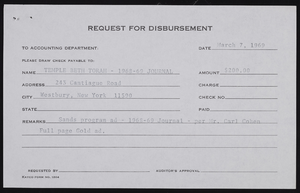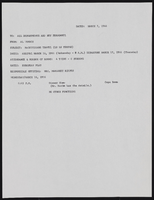Search the Special Collections and Archives Portal
Search Results
Video, Champions of Freedom montage for the Jewish Federation of Las Vegas, 2003
Date
Archival Collection
Description
Group of interviews and montage including community members and leaders for the Champions of Freedom gala held by the the Jewish Federation of Las Vegas.
Moving Image
Burt and Wilma Bass Photographs and Programs
Identifier
Abstract
The Burt and Wilma Bass photographs and programs mainly document the Bass’ involvement in the Jewish community of Las Vegas, Nevada, as well as their personal and professional lives. Images date from 1976 to 1987 and are entirely digital.
Archival Collection
Tyrone L. Seals oral history interviews
Identifier
Abstract
Oral history interviews with Tyrone L. Seals conducted by Claytee D. White and Sarah Beth Hawkins on April 25, 2016 and May 16, 2016 for the African Americans in Las Vegas: a Collaborative Oral History Project. In the first interview, Seals discusses his upbringing in Las Vegas, Nevada and growing up in the Westside. He talks about experiencing discrimination, employment limitations, and entertainment on Jackson Street. In the second interview, Seals remembers school integration, organizations for African American women, and protests during the 1960s. Lastly, Seals discusses the significance of religion in the African American community and becoming a pastor.
Archival Collection
Maria Banks oral history interview
Identifier
Abstract
Oral history interview with Maria Banks conducted by Barbara Hoyt on September 23, 1972 for the Ralph Roske Oral History Project on Early Las Vegas. Banks discusses her experiences managing a jukebox company, owning and operating two restaurants, and working for a music company. She also discusses her Mormon religion and the relationship she had with her late husband. Banks also discusses the change in climate over time, specifically the increasing humidity.
Archival Collection

Transcript of interview with Lilly Fong by Annie Yuk-Siu Shum, February 29, 1980
Date
Archival Collection
Description
Text
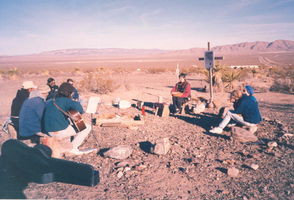
Sister Rosemary Lynch and unidentified protestors celebrating Ash Wednesday: photographic print
Date
Archival Collection
Description
Image
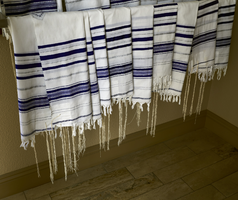
Photograph of Prayer Shawls, Henderson (Nev.), November 10, 2016
Date
Archival Collection
Description
A rack of Jewish prayer shawls at Midbar Kodesh Temple.
Image
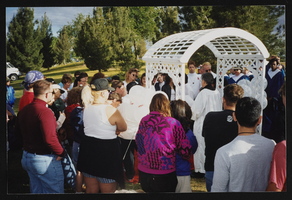
Mass holy union ceremony performed at Gay pride, image 004: photographic print
Date
Archival Collection
Description
Image

